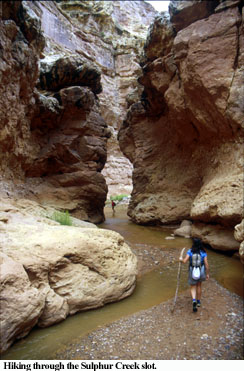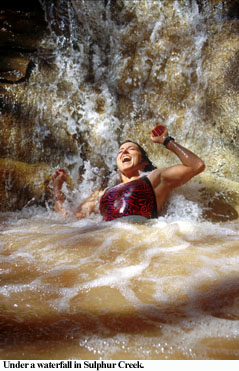 By Chance Cook
By Chance Cook
I normally sped through the town of Torrey in an attempt to save time as I make my way across Boulder Mountain and down into the awaiting basins of the Colorado Plateau. I had no idea that for years I had been setting my course right past one of the better half-day hikes Utah has to offer.
Capitol Reef National Park had never appealed to my strange desire to be locked in a canyon's tight grip. Besides Hall's Creek Narrows, which lay deep in the Park's southern reaches, nothing here really captured my imagination. I was about to be proven wrong.
The place is called Sulphur Creek and odds are, unless you are intimately familiar with Capitol Reef, you've probably never heard of it. The creek begins just a stone's throw from the picturesque Chimney Rock along State Highway 24. There, below the majestic red spires, lies a small and unassuming wash. And that is where this journey of discovery begins...
My traveling companions were a mere three; Dorothy, a vibrant and enthusiastic emergency room nurse who's insatiable thirst for hiking is infectious and her two sons, Tyler and Ian, who like most young teenagers, where anxious to explore one of the vast great playgrounds this state offers.
The day before our trek we wandered out to Sunrise Point Overlook to get our bearings. Below us awaited the canyon. It was a breathtaking sight, standing there hundreds of feet above Sulphur Creek. With the wind howling and tugging at my clothing, an innate feeling swept over me as I gazed downward into the narrow slit in the earth's hard crust. There was plenty of adventure to be had in the depths of Sulphur Creek.
 The night passed quickly and soon I was standing at the trailhead under the late August sunrise. My gear hung on me like a bad habit. Dry bags stuffed with photography equipment, plenty of water and 25 feet of rappelling rope, all strapped and jury-rigged onto my trusty daypack in a haphazard manner.
The night passed quickly and soon I was standing at the trailhead under the late August sunrise. My gear hung on me like a bad habit. Dry bags stuffed with photography equipment, plenty of water and 25 feet of rappelling rope, all strapped and jury-rigged onto my trusty daypack in a haphazard manner.
We crossed the road and as we stomped through the drainage, dust kicked up from our eight feet hung in the air like an awkward moment on a first date. Soon the mercury began to rise from its cool evening slumber, heating up the desert-varnished sandstone walls. Before it got too hot, we were off the rim where temperatures would soon climb into 90's.
The trail literally cut it's way through the Waterpocket Fold like a surgical instrument, peeling away the layers of Kaibab and Navajo sandstone right before our very eyes. We descended thousands of years into geological history in a matter of hours. The upheaval of the plateau became more evident with every mile we passed. It was as if we had hiked into a geologically layered cake lying on an angle.
Tyler and Ian would stop occasionally, examining the many chunks of feldspar, quartzite and mica sparkling in the rising sun. These glittering remnants are pieces of what makes this park such a gem.
Capitol Reef is a study in geology and a dream for even the most seasoned professor. The Waterpocket Fold is the park's main attraction and reason why it was given protective status as a National Monument on August 2, 1937 and later National Park on December 13, 1971. Created 50 to 70 million of years ago, The Fold occurred when the Laramide Orogeny reactivated an ancient buried fault. As the fault shifted, it created what geologists call a classic monocline, or "step." The west side of the Waterpocket Fold rose an astonishing 7,000 feet higher than the rim to the east. From there, natural erosion from rivers, rain and gravity have taken their toll, producing the many unique and stunning features of the park, this canyon being one of those attractions.
Within an hour our little party came across the confluence with another creek in which flowed with the desert's most valuable commodity--water. This stream eventually empties into the Freemont River, which twists and grinds its way eastward through the park.
The breeze blowing up-canyon into our faces carried the cool scent of moisture in its drifting arms, a welcome relief on an otherwise warm afternoon. Temperatures at the bottom are considerably cooler than the canyon's rim, with the wind and creek acting like a refrigeration system.
An occasional cottonwood tree spread its limbs across the river and trail, providing shade and a dash of green splashed across the deep, blood-red cliffs. Ian would later comment that the constant silence that had become our traveling companion was one of the things he remembered most. It was true. No ambient city noise. No traffic to mar the commanding silence of nature. There was no one else to share our canyon with, and as stunning a scene as it was, it was only a prelude to what we would see further downstream.
We wove our way back and forth through the Goosenecks. From high above fell the occasional jealous calls of those peering into the canyon's depths from the overlook where we had sat just a day before. How thrilling to become the spectacle for those who have yet to learn the way to the trailhead! I almost felt guilty at how simple it was to arrive down among the poplars and bright yellow wildflowers dotting the creek's banks. It takes less energy to walk to church and my chapel isn't nearly as grand a spectacle as where I now wandered.
Just past the Goosenecks, the first waterfall almost sneaks up on you. Not of any grand scale like falls found in Yosemite or Zion National Park, it is a humble little hindrance to the stream's steady flow. Cascading water splashes and tumbles down the rocks, off an overhang and into a pool below where the creek has carved somewhat of a cathedral downstream. During storms, flash floods can transform this little babbling brook into a torrent of raw, hydraulic energy; its force evident in the undercut canyon walls and large boulders polished "bowling ball" smooth.
I crept and crawled my way along the ledge in order to find the route. No rope was needed and minutes later I had scrambled and inched my way down the steep incline and soon was knee-deep in the cool water, enjoying the fine mist the cascading creek kicked up.
The second waterfall is much the same but offering up a cliff where you can leap into the muddy water below. But at the third waterfall Tyler found what he was searching for, a natural waterslide cut deep into the canyon's hardened bedrock. A warning however: it is dangerously slick, even when one's damp shoes are the only source of water upon its surface. Be careful, because it is a long way to the Visitor's Center to carry even a good buddy.
Dorothy, Ian and Tyler immediately began sliding down the falls and into the pool below. Overcome with boyish zeal which would shame Huckleberry Finn, I also spent time shooting down the natural slide. It was an hour well spent. Cooling down while simultaneously washing away most of the trail dust from our shorts. Even though it was one of the highlights of the day, there are other attractions hiding in the canyon.
Along the trail the canyon walls tighten up and release several times and with each turn, a new discovery. Novice hikers gain a sneak peak of what longer slot canyons offer to those who dare to escape the mundane.
There are places to slip and slide along the riverbed's smooth and polished rock, where water has taken the river thousands of years to polish to a fine slick surface. Perfect for any youngster, or those young-at-heart, to spend an hour or two playing the day away. Shady groves in which to picnic while watching the clouds blow lazily overhead. Pools to chase minnows and skip flat rocks, which are amongst some of the oldest rocks you will ever touch in your lifetime.
Large boulders for kids to scramble upon are so numerous, I lost track after the first mile. But this canyon is also a place of reflection and a wherewithal to escape the hustle and bustle of our everyday lives. Whatever your passion, whatever your relaxation, odds are anyone can find it here...
After the third and final waterfall, it was another hour of crossing and re-crossing the stream before it dawned on us exactly how quick the time had gone by. Before I knew it, we turned a corner and the rock formation known as the Castle came dramatically into view, reminding us that the hike's end was drawing near. Soon I was standing on the threshold of the Visitor's Center, covered in dried mud from my knees downward. My shirt stained an earthy pink from numerous guilty trips down the slickrock waterfalls and my backpack still carried a ridiculous amount of water and gear. But it was my face hosting an unsupressable grin told the true story.
Sulphur Creek didn't rank up there with many white-knuckler slot canyons I had navigated through during my lifetime. It didn't tax me mentally and I wasn't forced to wade through freezing ponds filled with rancid water. I had not seen my life flash before my eyes while dangling precariously from a cliff wall. It had been a pleasant hike, plain and simple... Therein lays the charm.
Not being much of a fan of overpopulated places, I've spent years ignorantly snubbing my nose in the direction of Capitol Reef. Yet nearly a decade later, I had traveled down into the depths of a crack in the earth's crust known innocently enough as Sulphur Creek. A place where the canyon's quiet arms can ease themselves around us. And through wildflowers and trickling streams the Earth can whisper to our very soul, reminding us that we humans are indeed momentary travelers passing through this dramatic environment.
A spot where those of us who take the time are lucky enough to hear that testimony amidst her grand hallways and impressive tabernacles. It was on that particular day that I discovered there are yet plenty of great places to get lost in Capitol Reef National Park.
(Copyright: Chance Cook, Jan., 2003)
